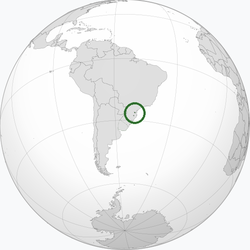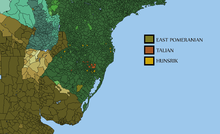Independent State of the New Southern Rhine
Independent State of the New Southern Rhine Unabhängicher Schtaat vum Neie Rhin im Sìd (Hunsrik) | |
|---|---|
| Motto: "Zwaa Schprooche, ei Vòlk"" "Two languages, one people" | |
| Anthem: "Anthem of the Lonely" | |
 Location of the New Southern Rhine in green. | |
| Capital and largest city | Barbarossa |
| Official languages | |
| Other languages | Portuguese |
| Ethnic groups (2021) | 100% White |
| Religion (2021) | 82.9% Lutheranism 15.1% Irreligion 2% Catholicism |
| Demonym(s) | Neo-Rhenish; Rhenish; Neo Southern Rhenish |
| Government | Unitary herrenvolk absolute monarchy |
• King | Jonathan I |
| Prince Antônio | |
| Legislature | Katarinensisch Reichskreis |
| Formation | |
• Negotiations | 23 December 2020 |
• Foundation | 06 January 2021 |
• Throne sworn in | 17 January 2021 |
| 1 September 2021 | |
| 1 August 2022 | |
| Area | |
• Total | 1.3 km2 (0.50 sq mi) |
• Water (%) | 0.2% |
| Population | |
• Census | 39 |
| GDP (PPP) | 2021 estimate |
• Total | Δ50.000 |
• Per capita | Δ1.923 |
| GDP (nominal) | 2021 estimate |
• Total | Δ82.000 |
• Per capita | Δ3.153 |
| Gini | ▼ 26.1 low · 159th |
| HDI (2023) | ▲ 0.950 very high · 6th |
| Currency | CS Doubloon (Δ)a (CSD) |
| Time zone | UTC−3 (BRT) |
• Summer (DST) | UTC−2 (BRST) |
| Date format | dd/mm/yyyy |
| Driving side | right |
| Calling code | +55 |
| Microcode | RN |
| Internet TLD | .RN |
| |
New Southern Rhine, officially the Independent States of the New Southern Rhine (Hunsrik: Unabhängicher Schtaat vum Neie Rhin im Sìd), often simply called The Rhine or New Rhine, is a small self-declared ethnostate, commonly recognized as a micronation, completely landlocked by the Brazil in the Southern Cone of South America. The small state has 1.3 km² (0.3 sq mi) and 41 citizens, 26 of whom are permanent residents of the national territory that is divided into enclaves in four municipalities within the Brazilian state of Santa Catarina. The capitap is the city of Barbarossa, named after the Holy Roman Emperor Frederick Barbarossa. The official and national language is Hunsrik, which is the native language of the entire resident population and around which the people's culture and ethnic state revolve.
The territories that currently comprise the New Southern Rhine were inhabited by indigenous Guarani and Xokleng for millennia before the European colonization of the Americas. Between the 16th and 18th centuries the Portuguese and Spanish disputed the territory until its definitive settlement by the Portuguese and its irreversible incorporation into the colonial Brazil. Following Brazilian independence at the beginning of the 19th century, the region experienced a large influx of German immigration, creating Teutonic cities and developing, from contact with other peoples, a unique culture that culminated in the emergence of the Hunsrik language. Aiming to create a state of his own based on this culture, in 2021 the Ebenthali noble Jonathan Scherer was elevated to the newly established throne of the New South Rhine, which from then on claims his family's properties as sovereign territory.
New Southern Rhine is a unitary absolute monarchy. Its official currency is, since its accession as a member state of the Conference of Santiago, the Conferential Doubloon, whose value is backed by the pyrite reserves of the CS Financial Authority. The country is also a member of the Micronational Trade Organization and is classified as a small power in the Brazilian sector, and is sometimes considered a client state of Ebenthal. Both countries, however, consider themselves sister nations due to the origin of the Rhine by the Incentive to Secessionist Micronationalism Campaign, having been idealized by the Ebenthali monarch Arthur van der Bruyn. Despite its de facto status as an ethnostate, the New Southern Rhine approves of any applications for citizenship, but only Hunsrik speakers have full access to national politics and citizenship rights.[1]
Etymology
The Fundamental Laws defines the country's official name as 'Independent State of the Rhine' in Article 1.
Art. 1. The Independent State of the Rhine is the political association of all its citizens. They form a free and independent nation which does not admit any bond that oppose its sovereignity.
— Fundamental Laws of the Rhine
The country's proper name was inspired by the homonymous Rhine river in Germany, being chosen because of the country's ties with Germany and the German culture. The Independent State's territory's first settlers were immigrants from the Bavarian and Rhenish regions of the former German Confederation during the 19th and 20th centuries. The variants of the name of the Rhine in modern languages are all derived from the Gaulish name Rēnos. The Gaulish name Rēnos (Proto-Celtic or pre-Celtic *Reinos) belongs to a class of river names built from the PIE root *rei- "to move, flow, run".
History
Background

In late 2020, the Conference of Santiago, a Brazilian-originated intermicronational organization, launched their Incentive to Secessionist Micronationalism Campaign, an effort to support newbie micronationalists in creating and governing micronations. The campaign included a program for creating and delivering micronations for micronationalists who, already engaged in a state's micronational policies, wanted to experience leading their own micronations but didn't know how to start one. By that time a micronation, the Hanseatic and Confederate States of Achsen, had already been created and successfully delivered from the program. In 23 December that year, King Arthur II of Ebenthal, one of the people in charge of the program, came up with the idea of founding a micronation in Southern Brazil under the name of Rhine in order to encourage micronationalism in the region.
Along with Emperor Oscar I of Karnia-Ruthenia, they came up with the project for the "Independent State of the Rhine. The micronation was thought to incorporate the German-Brazilian culture proper of the region on which it should be founded. The political name, Independent State, was suggested by the Ebenthali monarch, inspired by the Independent State of Croatia. The first movement was the creation of national symbols. These were discussed with no success as both Arthur and Oscar failed to accept any project of flag and coat of arms presented. Political organization was further discussed and it was agreed that, in order to avoid bureaucracy and in facing the prospect of few active government members, the country should be a centralized state in the form of an unitary state under a absolute monarchy. In time, shortly before the country's official foundation, a flag design by Arthur was approved, while Oscar designed a coat of arms.
Foundation

With most of the country's organization defined, the micronation was officialy founded through an Act in 6 January 2021. Independence from the Federative Republic of Brazil was formally declared through the Fundamental Laws, as well as from any other power potentially claiming to exert sovereignity or control over the Neo-Rhenish land. However, despite its formal establishment, the micronation initially was nothing more than an "empty shell", possessing no geographic territory and with the throne as well as all governmental offices vacant. The country was de facto a puppet state of Ebenthal, with the Ebenthali monarch exercising absolute control over the Neo-Rhenish state machine
In order to fulfill the program to encourage secessionist micronationalism in the Brazilian micronationalist scenario, the reins of the New Southern Rhine were to be handed over to another micronationalist, and Ebenthali and Karno-Ruthenian sovereigns began to look for a possible candidate for the Neo-Rhenish throne. During this period, the King of Ebenthal limited the search to micronationalists from the south of Brazil, in order to fulfill his objective of establishing an active micronation in the Brazilian sector from that region, so empty of micronations. It was then that on 15 January 2021, Arthur, acting in an unofficial capacity as Acting Regent of New Southern Rhine, offered the throne of the country to Jonarhan Scherer, 1st Marquis of Rozandir , a noble who served as the Lord Speaker of the College of Peers of the Realm, the former parliament of Ebenthal. A native of the region, from Jaraguá do Sul, and eager for new experiences in micronationalism, the noble Ebenthali formally accepted the offer on January 17, after agreeing that he would be assisted by the Ebenthali state in structuring and defense of their new nation.
As "King by the Rhine", Jonathan's first act was to cede sovereignty over his family's properties in four Brazilian municipalities to the Neo-Rhenish State, following the precepts of the Nomadic Micronation Theory, and establishing a geography for the country. Then, the new monarch distributed positions to members of his family and closest friends.
Contemporary history
Once completelly established as a sovereign micronation, in 18 January 2021 King Jonathan I issued a decree on which he signed the Treaty of Persenburg and the Protocol of Goetha, as well as the Treaty of Santiago and the New Southerni Rhine officialy joined the Conference of Santiago by voting, as it was required by the Conference's program to improve secessionist micronationalism. The Neo-Rhenish Provisional Government (GPNR) was created and the recruitment of micronationalists was initiated supported by Ebenthal, Karnia-Ruthenia and Achsen, a micronation founded under the same auspices of the secessionist program that New Rhine. The Conferential Doubloon was officially adopted as the country's official currency and the bought of a pyrite stock have been scheduled to take place until the end of the year, whilst the treasure's very low resources go through calculation.
In 20 January 2021 Emperor Oscar I of Karnia-Ruthenia suggested the country's name should be changed from "The Rhine" in order to relate to the geolocation of the micronation and avoid possible confusion. The matter was taken to King Jonathan, who had just appointed his brother Antônio I, Prince of New Switzerland, as Archsteward, a de facto position roughly equivalent to of head of government. Antonio suggested the name "New Southern Rhine" which was officially adopted on 9 August 2021 amid major structural reforms. At the end of that year Oscar I of Karnia-Ruthenia renounced his title of Prince of Pomerode, leaving Arthur II of Ebenthal, as Prince of Blumenau, as sole heir to the Neo-Rhenish throne and creating an inconsistency in the Fundamental Laws of the country that predict that the current King would be succeeded by a diarchy formed by the sovereigns of the two foreign nations primarily responsible for establishing the New Rhine.
From 18 April to 2 May 2022, the Neo-Rhenish Government engaged in supporting its allies of the Conference of Santiago from the difamation campaign waged by the Kingdom of Manso on what became known as the Xingu Affair. The Archsteward, Prince Antônio, justified the positioning of the New Southern Rhine as not only the defense of its allies, but as an opportunity to show the Neo-Rhenish Government's desire to play a major role in the Brazilian sector politics. In this regard, the country's government, which had once chosen to move away from Ebenthal to solidify its image as an independent and sovereign micronation, decided to approach it again in July 2022, initiating the application process for the use of the Ebenthali kupfermark as the official currency aiming to create a monetary union. As economic talks continued, on 1 August 2022 the New Southern Rhine became a founding-member of the Micronational Trade Organization.
Geography
The Rhine's lands are located in the Southern Cone of South America, below the Tropic of Capricorn, enclaved in the towns of Blumenau, Jaraguá do Sul, São Joaquim and Pomerode, in the Brazilian state of Santa Catarina. The entire territory of the country is composed of house buildings and backyards, with no original water body and provides no natural resources.
With an estimated total area of 1.3 km², the Rhine spans only one time zone, the UTC−3, and the summer time zone UTC−2. The country's natural topography is simple: half of the country lies above 1,300 meters and another half lies above 20 meters in relation to the sea level. The first half lies in highlands on a chain of mountains and valleys, while the latter, in a plain dotted with some hills.
Climate
The climate of the Rhine is fairly stable. According to the Köppen system, the dominating climate is the highland oceanic modified for precipitation sufficiently moist in every month with cool summers and low temperatures in winter, but not so below freezing point. The average annual temperature is 11.4 °C to 18.3 °C. Since the maximum average does not exceed 24 °C. At the same time, the minimum averages are above 7 °C. The annual precipitation is high from 1450 mm to 1650 mm and about 135 rainy days. Frost and snow are commom phenomenons in most of the country, although for a very brief time annualy.
Because of its geographic situation, the country is often reached by cold fronts advancing from Antarctica, especially during autumn and winter, causing frequent cool and cold climates, respectively on the plains and highlands. During summer, the country is struck by strong and constant rains. With most of its territory much higher than the sea level and subject to dry polar air masses, the Independent State of the Rhine could be regarded as South America's coldest nation (proportionally) and micronation.
Government and politics
The 2023 Häärnvolk Briew replaced the Fundamental Laws as the charter of the New Southern Rhine and establishes the country's form of government as a herrenvolk unitary state under a absolute monarchy with model elements parliamentary in order to secure the position of the Sovereign as an enlightened despot. The Monarch, with the title of "King of the Rhine" is formally the head of state and head of government, however this last position is delegated and de facto exercised by the Archsteward, who is also the speaker of the Katarinensisch Reichskreis, the national unicameral parliament. Judiciary power lies solely with the King, who is nevertheless bound to abide by the Häärnvolk Briew and by the Acts of Parliament. Furthermore, in order to preserve the culture in which the state was founded (this being one of the objectives for its creation), only native speakers of Hunsrik have full citizenship and enjoy political rights such as enfranchisement.

The New Southern Rhine is divided into four autonomous cantons, each one ruled by a Steward appointed by the Monarch. The country's union is indissoluble and is set on the principles of sovereignity, citizenship and cultural ties. All branches of government (executive, legislative and judiciary) are formally established by the Häärnvolk Briew and are drawn from the Crown, thus being a very centralized and autocratic regime. The executive power is organized in two spheres of administration, while the legislative and the judiciary are organized only at the national sphere. Due to its strong historical relationship with Ebenthal and the involvement of Ebenthali citizens in Rhenish politics, New Southern Rhine is sometimes labeled as an client state of Ebenthal.
The Katarinensisch Reichskreis is composed by the four Stewards and headed by the Archsteward, all formally appointed by the monarch (but often the local family heads), plus four Commissioners popularly elected, one for each canton. While the Stewards' office is de facto largely cerimonial and they rarely get to actively participate in the legislative discussions, the Comissioners are often tasked with representing the absent stewards and, in doing so, they hold a double vote. Given this, the national parliament de facto works with four Comissionares with the voting power of eight people plus the Archsteward acting as speaker of the house and undoing ties. There are no political parties in The Rhine, as according to the Fundamental Laws and later the Häärnvolk Briew, they are damaging to the political process and divisive to society.
Law

Rhenis law is based on Roman-Germanic traditions and civil law concepts prevail over common law practice. The basics of Rhenish law is codified as the Fundamental Laws, although non-codified statutes represent a very substantial part, playing a complementary role. Court decisions set out interpretive guidelines; however, they are seldom binding on other specific cases. Doctrinal works and the works of academic jurists have strong influence in law creation and in law cases.
There is no judiciary court in New Southern Rhine, and judiciary authority lies with the monarch. The legal system is based on the Fundamental Laws, which was promulgated in 6 January 2021. All legislations must conform to its rules. The cantons have their own basic laws, which must abide by the Fundamental Laws. Legislative entities are the main source of statutes, although in certain matters judiciary (King-in-Court) and executive (King-in-Parliament) bodies may enact legal norms.
Military
The Independent State of New Southern Rhine does not have any military, although the Fundamental Laws provides for the possbility to create an Armed Force in case of need, and it relies mostly on the Brazilian police system (State of Santa Catarina Military Police). In 18 January 2021 King Jonathan I of the Rhine and King Arthur II of Ebenthal signed a treaty by which the Kingdom of Ebenthal is tasked with the external defenses of New Southern Rhine, although de facto it only means cerimonial protection and defensive virtual warfare (the treaty was virtually nulified by the extinction of Ebenthal's armed forces). The Rhine, though, keeps a cerimmonial guard for the King.
The country's inner security is enforced by the Stewards individually with the support of temporary civilian agents.
Administrative regions
The Independent State of New Southern Rhine is an unitary state divided into four autonomous cantons. Each canton is administrated by a Steward nominally appointed by the King, but often the head of the local family branch. There is no distinction in a steward's role between ruling the canton as a whole and the municipalities within it. Each canton enjoys of a fine degree of administrative autonomy, but they cannot enact laws. All the cantons are comprised by private property owned by King Jonathan's immediate family.
| Flag | Canton | Canton code |
Capital | Other cities | Enclaved in | Citizens | Area (km2) | Official language(s) | Government | Ruler |
|---|---|---|---|---|---|---|---|---|---|---|

|
Kaiserwerth |
KSW | Barbarossa | Hohenstaufen | Blumenau | Hunsrik Portuguese |
Directorial province under absolute monarchy | Steward Antônio Scherer-Arrais | ||

|
Hochdeutsch |
HCD | Däzchen | None | Pomerode | Hunsrik | Directorial province under absolute monarchy | Steward Guilherme Däzchen | ||

|
Katarinensisch Palatinate |
PSC | Süpplingenburg | Jagst Tauber |
São Joaquim | Hunsrik Portuguese |
Directorial province under absolute monarchy | Steward Martha Scherer | ||

|
Artstetten |
ATT | Schroeder | Hruschka | Jaraguá do Sul | Hunsrik Portuguese |
Directorial province under absolute monarchy | Steward Wagner Scherer |
Foreign policy
The Neo-Rhenish foreign policy consists of non-intervention, self-determination, international cooperation and the peaceful settlement of conflicts. The matter is taked to the Secretary of State for the Interior Affairs, which is appointed by the King, but it is ultimatelly headed by the King himself as the supreme authority on foreign policy as defined by the Fundamental Laws.
The Independent State's foreign policy is a by-product of the country's microposition as a new and poorly-populated micronation with few government officials. The country relates itself mostly with other micronations at the Brazilian sector. Rhenish foreign policy has generally been based on the principles of multilateralism, peaceful dispute settlement, and non-intervention in the affairs of other countries.
Furthermore, the Fundamental Laws provides that in case of the present King's abdication, the country shall become a diarchy headed by the King of Ebenthal and the Emperor of Karnia-Ruthenia and keep its present sovereign territory, and that the micronation may not be annexed peacefully or join a crown union, but be ruled under personal union. As a result of this accord, Ebenthal and Karnia-Ruthenia have been the first micronations to establish formal diplomatic relations with the New Southern Rhine.
Economy

The Rhenish total economy is to be calculated, but the country's economy currently relies on a very little amount of pyrite, used as source of value for the country's official currency, the Conferential Doubloon. The country's Gross Value Added, this means, the sum of all Rhenish properties, is estimated to be that of R$3 million Brazilian Reais, about to US$600.000 US Dollars. The Rhenish internal economy revolves around the circulation of money to the national budget through the payment of salaries and the circulation of wage values among micronational economic sectors. Externally, however, the economy is more varied, with the production and exportation of manufactural goods and the offer of virtual services, such as programming, editing and design, in which part of the total profits is poured into maintaining the micronation. The New Southern Rhine also participates in the Conference of Santiago's common market.
The Conferential Doubloon is the official currency, pegged to the pyrite standart (converted to Brazilian Real), following a managed-float monetary policy by the Conference of Santiago Financial Authority and implemented through the Rhenish Treasure. Nonetheless, most of the country's business is done in Brazilian Real.[a]
The Rhenish state, so far, have few expenses, of which the higher, dealt with in Brazilian Reais, is the maintenance of the micronational portfolio such as virtual spaces. Other expenses includes the allocation of the Royal Family and the salaries of civil servants.
Infrastructure

Science and technology
Scientific and technological research and development on the New Southern Rhine is officially coordinated by the Royal Science Commission whose members are appointed by the King at the notice of Archsteward. However, little has been developed nationally by the government beyond the creation of communication platforms. Most of the investment in research, development and scientific and technological acquisition is private. The largest scientific area under development in the country is information technology, of which New Southern Rhine is an exporter.
The government has projects for the creation of a Portuguese translation application for riograndenser hunsrückisch, as well as for the creation of a National Hunsrik Institute for varied scientific research and development. Pre-studies show that in addition to information technology, another prominent area of scientific research is linguistics.
Education
The Fundamental Laws dictate that all citizens of New Southern Rhine have a moral duty to be educated as best as possible, even though the state does not provide for this. He also says that it is not mandatory, but preferably, that everyone is educated both in Portuguese and in German, not only in the language, but also in aspects of the cultures that surround those languages and their speaking peoples in South America and Europe.
In August 2021 the Rhenish Government was able to register that of the citizens of legal age, all are either studying or have completed higher education. As the country does not have educational institutions, the Rhenish are formally educated in Brazil and attend Brazilian universities. Also, according to the Royal Education Commission, the literacy rate is 100%. The elderly population, however, presents some disparity in literacy, being highly literate in German and virtually illiterate in Portuguese.
Health

According to the Fundamental Laws, the Rhenish people has the right to health and all needed treatment. However, the state is unable to provide due to its micronational limitations such as lack of proper funds and land. All Rhenish citizens benefit from the Unified Health System in Brazil, and it is estimated that between 80% and 100% have private health plans. Despite enjoying Brazil's public health system, the New Southern Rhine has its own health-related laws that differ from Brazilian laws, for example, the legality of the use of medical cannabis (which is illegal in Brazil).
Rhenish health is considered satisfactory and stable by the government. The leading cause of death in New Southern Rhine is age-related illness, as the country arguably has the highest life expectancy on the continent (83 years). There is, however, a considerable rate of cardiovascular disease and Alzheimer's in the elderly population. External factors such as violence and suicide did not occur either in the country or with its citizens. Another type of common illness is mental disorders such as depression and anxiety which, although not causing deaths, affect a considerable percentage of the population.
In 2021, amidst the COVID-19 Pandemic, the Rhenish Government decreed that citizens who refuse to take the vaccine once it is offered, or who actively work against vaccination efforts (for example, spreading fake news) will be punished with the loss of citizenship.
Demographics

As of January 2021, the registered Rhenish population is that of 26 citizens, of which 17 resides in national territory and 7 are government officials. With a ratio of men to women of 6:10, approximately the entire population is defined as urban. The geographical distribution of the resident population is quite unbalanced, with half living in the southern canton and the other half scattered between three other cantons up-north. Rhenish society presents a very low income inequality, although there is a disparity between the upper-midle class and the higher class.
The government so far have done a quick research on the country's population, neverthless the government declared that an official census will be carried out.
Race and ethnicity
According to the government's estimates, the country's population is tremendously homogeneous, being entirely made of white people. Nonetheless it is also estimated that at least a little part of population have amerindians or mixed-race people (and thus also african people) among its ancestors, due to the uncommon yet occurring mixing between Germanic immigrants and Brazilians of multiple origins.
Following the eviction of the local native tribes by the Portuguese in the 18th century, the present Rhenish territory was settled mainly by Germans and Austrians but also by Polish and Ukrainians, starting in the 1830s, peaking between the 1880s and 1920s, until the end of the immigration period in the 1960s.
The homogenity of the Neo-Rhenish population is unique among Latin America's micronations, and the country is located in a white-majority continental macroregion which is the Southern Cone. On spite of it, the Neo-Rhenish Government guarantees provisions against racism and actively seeks to expand the national genetic pool by bringing all kinds of people to the micronation.
Religion

The Independent State of the New Southern Rhine is very cohesive religiously, with almost 85% of the population declaring themselves as Christians, whereas 82.9% are Lutherans, a heritage from the German Protestant colonization, and 2% are Roman Catholics, mainly due to convertion through marriage. 15.1% of population are counted as irreligious, wheter they are atheists or agnosticism. The New Southern Rhine has as no official religion, and the government is officially committed to religious secularism. Freedom of religion in the Rhine is a constitutionally protected right, allowing individuals to assemble and worship without limitation or interference. The practise of religion is now fully considered a private matter throughout society and the state. The vast majority of Rhenish though did consider religion to be important in their daily lives.
Despite of the absence of any Spiritist denomination in the Rhine, many Rhenish Christians holds some Spiritist views such as the one of reincarnation. This is due to the popularity of these beliefs across Brazil, which eventually penetrated other religions. The Rhenish government has stated it will fight neo-charismatic protestant denominations, mainly Evangelicals, who spread prejudice regarded by the Fundamental Laws as crime (example, priests speaking against LGBT rights, regarded as basic human rights and civil guarantees).
Language

According to the Fundamental Laws, the Brazilian German and the Portuguese are the country's two official and national languages, both spoken natively by the entire resident population, whereas official administrative and business documments are bilingual. On the case of the German language, the Fundamental Laws also state that the Brazilian dialect Hunsrik, also called as Riograndenser Hunsrückisch, is the official form adopted by the state whilst other variants such as the Katarinensisch, Pomeranian and the Standart German are accepted as well. The English works as diplomatic language, being used in propraganda and provided with information by the government. The Brazilian Sign Language, more commonly known by its Portuguese acronym LIBRAS, is the official language to deaf people, and the government promotes the inclusion of deaf people in the micronationalism.
The Hunsrik, spoken in New Southern Rhine, has had its own development, mostly similar to the Hunsrückisch dialect spoken in the Rhineland-Palatinate region of Germany, but it has also been greatly influenced by other German dialects such as East Pomeranian and Plautdietsch, and by Portuguese, and to a lesser extent, by indigenous languages such as Kaingang and Guarani and by immigrant languages such as Venetian and Talian. The Brazilian Portuguese, as well, has developed on its own, being mostly similar to 16th-century Central and Southern dialects of European Portuguese on its Portuguese genesis, but heavily influenced, specially in the phonetics, by immigrant from Central Europe and Italy.
Minority languages spoken in the Independent States include the French as a second language, and the Talian, Polish as native languages. English is the most widely spoken second language, with approximately 70% of the country's population being able to speak it.
Culture

The core of the Neo-Rhenish culture is derived from the Catarinense culture, a sub-product of the Southern Brazilian and German cultures. Nonetheless, the German culture stands out stronger, in the form of traditions brought from Germany to Brazil which were kept by the German-Brazilians and subsequently by the Neo-Rhenish, specially the Hunsrik language which was developed from German in Southern Brazil. Among other influences, the German language, architecture, their religion, the Lutheranism, their legends, festivals, cuisine, symbology and political structure are strongly present. The Brazilian culture also presents itself as a sub-product from the Portuguese culture, influenced by African and Amerindian cultures, althogh in a much lightes way in this geographic region, in the form of the Portuguese language, social skills, music and religion.
In August 2021 the Neo-Rhenish Government has declared that its main cultural mission is to safeguard and promote the Riograndenser Hunsrückisch language, also known as Hunsrik (and Katarinensisch), a German dialect originated in Brazil, and the culture developed by and around its native speakers.
Architecture
The architecture of New Southern Rhine is specially inspired by the German architecture in the forms of half-timber, the style in which all homes in the country were built. Most of the houses use stone and wood, but there are still houses made entirely of wood, just like the sheds. The residences still have some eclectic airs, with neoclassical style in external constructions. The modernist style is also very present, in some cases mixing with the classic half-timbered style. The Neo-Rhenish Government has been encouraging the maintenance of the half-timbered architecture as well as its modernization through the mixing with modern style, specially regarding glass walls and wider windows. This in order, not only to modernize the country, but to help developing the Hunsrik culture, creating an architectural style of its own, based in both German and Luso-Brazilian architectures, analogue to how the Hunsrik language developed.
Music
The most popular music genre listened to in the New Southern Rhine is Rock n' Roll and Folk music, specially of British, Escandinavian and German origin. The Neo-Rhenish Government never held any official survey on the matter, but it is further estimated that the most produced music type in the country is both Rock and Folk, and that at least 30% to 40% of the country's population is profficient in some instrument, specially guitar, flute and piano. Folk music, and also Classical music is more popular with the older population, while the younger, including middle-aged people, consumes Rock and its variants, including Metal and also Brazilian popular music. Among the most listened artists and singers are the American band Led Zeppelin, the Swedish band Abba, the British band Queen, the German composers Richard Wagner and Beethoven. Many people still listend to amateur musics sang in Hunsrik which are played in local radios.
Literature

The New Southern Rhine does not have a literature of its own. The literature consumed in the country is mainly German, Brazilian, American and British. German literature is consumed especially by the elderly and children in the respective forms of legends and tales. However, a lot of German philosophy is consumed too, such as Nietzsche, Friedrich Schiller, Gotthold Ephraim Lessing, as well as poetry, such as the works of Johann Wolfgang von Goethe. Brazilian literature is present in the lives of the Neo-Rhenish in the form of the classic works of Machado de Assis, José de Alencar, Clarice Lispector, and especially in the realistic and brutal works of poetry by Cora Coralina, whose works are admired for the similarities between peasant life she led and the peasant life of German immigrants who settled in Brazil and their descendants. In addition, popular literature of American and British origin is also widely consumed, especially by younger people. According to recent data, the Lord of the Rings book series is the most popular collection of popular and non-German literature on the Rhine. Poetry, epics and philosophy are the subjects most appreciated by the Neo-Rhenish.
The Independent Rhenish Library is the first and only public library administered by the Neo-Rhenish Government, located in the municipality of Däzchen. In its collection, it has more than 1000 copies of various literatures. On Saturdays, the library offers copies for sale at the weekly fair in Pomerode.
Cuisine

The Neo-Rhenish cuisine is marked by the German traditional cuisine, a reflection of German immigration to Brazil. Neo-Rhenish cuisine works mainly with four foods: pork, potatoes, various sauces and sweets. Wiener Schnitzel can be considered the traditional dish of the New Southern Rhine, since almost an adaptation of one of the traditional dishes of Brazil, filet with fries. It nonetheless disputes this status with Kassler, a smoked pork and herb dish is considered the best national salty dish. Other national dishes include the Schweinshaxe mit Sauerkraut and the Currywürst, which is the most known and eaten Neo-Rhenish dish or snack, while sweets are the famous Pretzel, the Apfelstrudel and the Schwarzwälder Kirschtorte, also known as Black Forest cake.
Sports
The most popular sport in New Southern Rhine is football. The micronation does not maintain any sports team. The Royal Citizenship Commission found that 70% of the citizens of New Southern Rhine have more interests in the games of European football teams, especially Germans, than Brazilians and South Americans. It is estimated that at least 1/4 of the population plays sports casually, mainly soccer and swimming. Skateboarding has recently gained prominence among the younger population.
National holidays
| Name | Date | Notes |
|---|---|---|
| New Year's Day | 1 January | The first day of the Gregorian year. |
| Peace Day | 6 January | Independence of New Southern Rhine from Brazil |
| International Workers' Day | 1 May | Honors the contributions that workers have made to the country's strength, prosperity, and well-being. |
| Hunsrik Day | 23 June | Honors the Hunsrik language, the native language of the Neo-Rhenish population. The date was chosen from when Teewald became the first Brazilian city to make the language official. |
| International Missy Barrat Day | 30 August | Marked as a day dedicated to doing good deeds and encouraging others to do good deeds, associated with the fictional character Missy Barratt. |
| Children’s Day | 12 October | Honor children, promote mutual exchange and understanding among children and initiate actions to benefit and promote the welfare of the world's children. |
| Teachers's Day | 15 October | Special day for the appreciation of teachers and their special contributions to the society. |
| Christmas Day | 25 December | Traditional commemoration of the birth of Jesus. |
| New Year's Eve | 31 December | The final day of the Gregorian year; Saint Sylvester's Day. |
See also
Notes
- ↑ Despite the fact that the Conferential Doubloon is the country's sole official currency, the Brazilian Real remains the most used currency in day-to-day affairs in Ebenthalthe Rhine as well as the engine of the country's macroeconomic policy; it is also used as a conversion standart to calculate the CS Doubloon value.
References
- ↑ Neo-Rhenish Government. The New Southern Rhine. Published on 20 December 2021. Retrieved on 20 December 2021.



